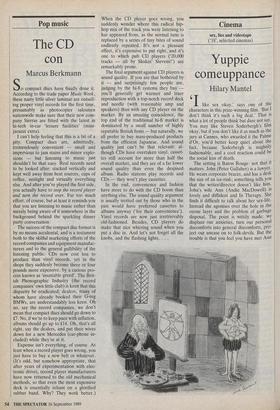Pop music
The CD con
Marcus Berkmann
o compact discs have finally done it. According to the trade paper Music Week, these nasty little silver laminae are outsell- ing proper vinyl records for the first time, presumably as photocopier salesmen nationwide make sure that their new com- pany Sierras are fitted with the latest in hi-tech in-car `leisure facilities' (mini- jacuzzi extra).
I can't help feeling that this is a bit of a pity. Compact discs are, admittedly, tremendously convenient — small and impervious to jam stains and minor explo- sions — but listening to music just shouldn't be that easy. Real records need to be looked after: stacked vertically and kept well away from heat sources, cups of coffee, sunlight and virtually everything else. And after you've played the first side, you actually have to stop the record player and turn the record over. Far too much effort, of course, but at least it reminds you that you are listening to music rather than merely being aware of it somewhere in the background behind the sparkling dinner party conversation.
The success of the compact disc format is by no means accidental, and is a testament both to the skilful marketing efforts of the record companies and equipment manufac- turers and to the general gullibility of the listening public. CDs now cost less to produce than vinyl records, yet in the shops they suddenly become three or four pounds more expensive, by a curious pro- cess known as `insatiable greed'. The Brit- ish Phonographic Industry (the record companies' own little club) is keen that this disparity be eradicated; dealers, many of whom have already booked their G-reg BMWs, are understandably less keen. Oh no, say the record companies, we don't mean that compact discs should go down to £7. No, if we're to keep pace with inflation, albums should go up to £14. Oh, that's all right, say the dealers, and put their wives down for a new Mercedes (car-phone in- cluded) while they're at it.
Expense isn't everything, of course. At least when a record player goes wrong, you just have to buy a new belt or whatever. (It's odd, but somehow appropriate, that after years of experimentation with elec- tronic drives, record player manufacturers have now returned to the old mechanical methods, so that even the most expensive deck is essentially reliant on a glorified rubber band. Why? They work better.) When the CD player goes wrong, you suddenly wonder where this radical hip- hop mix of the track you were listening to has appeared from, as the normal tune is replaced by a series of tiny bites of sound endlessly repeated, • It's not a pleasant effect, it's expensive to put right, and it's one to which pub CD players ('20,000 tracks — all by Shakin' Stevens!) are remarkably prone.
The final argument against CD players is sound quality. If you are that bothered by it — and surprisingly few people are, judging by the hi-fl systems they buy — you'll generally get warmer and truer reproduction with a top-notch record deck and needle (with reasonable amp and speakers) than with any CD player on the market. By an amazing coincidence, the top end of the traditional hi-fl market is dominated by a small number of highly reputable British firms — but naturally, we all prefer to buy mass-produced products from the efficient Japanese. And sound quality just can't be that relevant: al- though CDs have overtaken vinyl, casset- tes still account for more than half the overall market, and they are of a far lower sound quality than even the despised. album. Radio stations play records and CDs — they won't play cassettes.
In the end, convenience and fashion have more to do with the CD boom than anything else. The sound quality argument is usually trotted out by those who in the past would have preferred cassettes to albums anyway ('for their convenience). Vinyl records are now just irretrievably old-fashioned. Besides, CD players do make that nice whirring sound when you put a disc in. And let's not forget all the knobs, and the flashing lights. . . .


































































 Previous page
Previous page